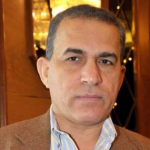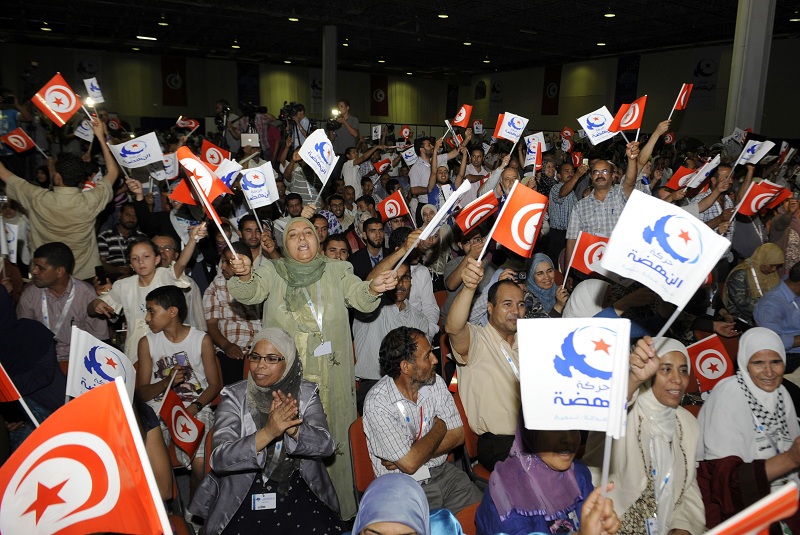An internal dispute within the Salafi Al-Nour party captures the attention of one columnist, while another focuses on the ongoing conflict on the Nile University campus. The reasons behind Arab disunity are also considered, as is the removal of revolutionary graffiti in Tahrir square.
What happens inside “Al-Nour” party kills the darkness
Emad Al-Din Hussein
Al-Shorouk newspaper
An internal conflict within the Salafi Al-Nour party prompts Hussein to attempt to shed light on the inner workings of the party. Keeping in mind that the Al-Nour party won a quarter of the seats in the now dissolved parliament, Hussein hopes that the conflict, said to be based on separating the party’s political activities from its religious ones, will fade away soon.
Unconfirmed reports state that Emad Abdel Ghafour, the party’s chairman, wants to limit the party’s pursuit of political interactivity, whereas another contradictory trend, which hopes to keep Al-Nour’s focus on increasing awareness of Islam as a religion, is rising and led by sheikh Said Abdel Azim. Hussein hopes that calls advocating the political functionality of Al-Nour will eventually win.
He believes the importance of recalling the Islamic Shari’a should materialise in certain programmes within the party. He commends Al-Nour for its position towards respecting the peace treaty with Israel and its positive stance towards the IMF loan. Hussein concludes by stressing that the Salafi wave in Egypt is a wide one that should omit their past parliamentary mistakes.
A moment that we miss Morsy in
Soliman Gouda
Al-Masry Al-Youm newspaper
The ongoing debate regarding Nile University requires President Morsy’s intervention, writes Gouda. Praising the president’s performance and impressive speech during his recent visit to Tehran, the columnist states that there are times where Morsy’s leadership has caused a genuine difference.
He recalls the president’s courageous move to announce Egypt’s position towards Syria and states such an initiative had been missing for a long time in Egyptian politics. Gouda then considers the Nile University strikes and states that the case has been referred to prime minister’s office, where nobody has succeeded in resolving the dispute.
As high-ranking employees have failed to resolve the issue, Gouda believes it is time for Morsy to intervene. It is a presidential duty to safeguard the future of students (who are being expelled from their campus due to the unresolved quarrel). Losing an academic centre such as Nile University would be a loss for Egypt, therefore, the case is in need of a little of Morsy’s precious time.
Swearing by Quran
Mohamed Amin
Al-Masry Al-Youm newspaper
Amin points to the appointment of the new head of State Security Investigation Services and his vow on the Quran while taking oath in his new office. Swearing on the Quran has never been a habit of state security officers, Amin says. He believes it could be a sign of Morsy’s unjustifiable fears and concerns while leading the country.
Raafat Shehata swearing an oath on the Quran raises a question as to whether his loyalty is to the president or the country, Amin says. He believes Morsy’s obsession with the issue of national security probably prompted him to ask Shehata to swear by on the Quran.
Amin then refers to the tight security that accompanies the president’s performance of Friday prayers. Instead of gaining much media attention every Friday over where the president will pray, it seems his security guards have understood the importance of keeping such information confidential.
Amin concludes that taking oaths on the Quran is a newly developed habit that demonstrates the increasing ‘Ikwanisation’ of the state. He warns against the Muslim Brotherhood dominance over the institution of State Security Investigation Services and believes that the situation could extend further to reach important ministries like judiciary and interior.
Why the bug of division between us?
Moataz Billah Abdel-Fatah
Al-Watan newspaper
Abdel-Fatah considers the factors causing division and disunity between states in the Arab world and within Arab states themselves.
As a starting point, the writer analyses the psychological aspect of ‘Arabness’ in general, stating that most Arab leaders suffer a high sense of insecurity that hinders them from working in collective political activities. The apparent lack of self -confidence drives them to pursue more authoritarian roles.
The writer then highlights that Arab commanders always wish to be the leader of any political gathering, to the extent where their not being so often deters them from united participation.
Moreover, Abdel-Fatah rests his argument on the conviction that Arabs by nature dislike the idea of delegating tasks. Everyone wants to assume all positions at all times and in all places, the writer states. A final reason for the constant separation between Arabs is the fact that they hate other leaders being praised for their achievements.
The true eradication, revolutionaries
Emad Al-Din Adib
Al-Watan newspaper
Referring to the outrage that followed the elimination of the 25 January revolution graffiti from Tahrir Square, Adib highlights that the removal of the artwork does not imply the usurpation of the uprising and its objectives.
Adib addresses revolutionaries and asks them whether they turned to the original slogans of the revolution when they earlier focused attention on appearing in daily talk shows and forgetting about the March 2011 constitutional referendum and the increasing wave of political Islam, which dominated the previous parliament.
The writer condemns the period following the revolution when analysts were tested for using the word ‘former’ or ‘ousted’ when they refer to Mubarak. He also chides figures who wouldn’t start a talk on any public occasion before excessively praising the revolution.
Instead of the intense feeling of frustration against the hygiene workers who eliminated the expressive illustration of the revolution from the square’s walls and fences, Adib suggests it’s better to focus on the real usurpers of the revolution.
Finally, the writer states that the eradication of the symbols of the uprising should not trouble revolutionaries as much as they should be disturbed by the process of completely eliminating the whole notion behind the revolution.






